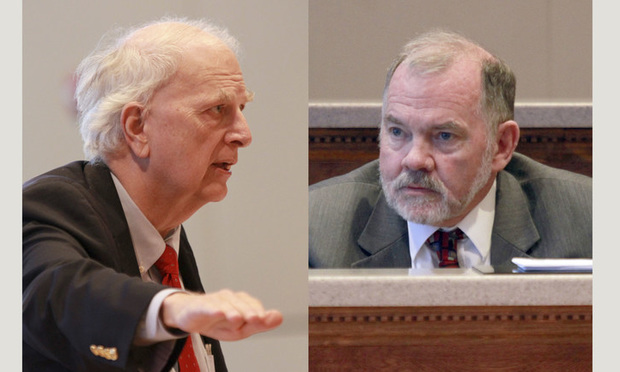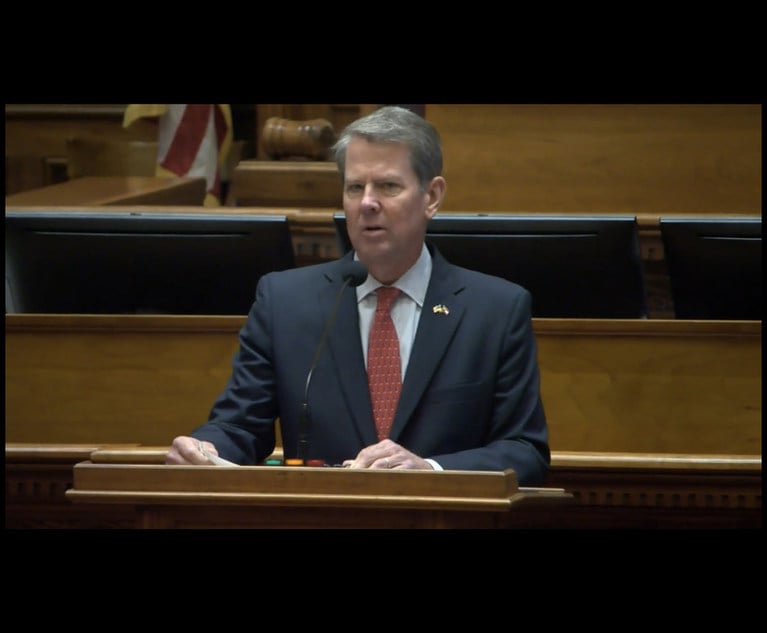Suspended Judge's Counsel Contends Judicial Watchdog Appointments Are Illegal
A Cobb County judge will hear a petition filed by former Gov. Roy Barnes claiming that members of the state Judicial Qualifications Commission were illegally appointed.
March 06, 2019 at 03:29 PM
4 minute read
 Roy Barnes (left) and Mack Crawford (Photos: John Disney/ALM)
Roy Barnes (left) and Mack Crawford (Photos: John Disney/ALM)
A former Georgia governor is challenging the legality of appointments to the state's judicial watchdog agency in his defense of a suspended judge.
Former Gov. Roy Barnes of Marietta's The Barnes Law Group has filed a writ in Cobb County Superior Court contending that the appointments of the 10-member Judicial Qualifications Commission are illegal because they were not sent to the state Senate for confirmation until after the statutory deadline.
As a result, Barnes contends the JQC's three-member hearing panel—which can recommend that Crawford be stripped of his judgeship—has no authority to investigate his client, Pike County Superior Court Judge Robert “Mack” Crawford, or bring ethics charges against him.
On Tuesday, Cobb County Superior Court Judge Ann Harris set a March 19 hearing date on Barnes' quo warranto petition challenging the JQC appointments and the legitimacy of the JQC's investigation of Crawford. The quo warranto asks that JQC members demonstrate their legal basis for holding and exercising their public office.
The JQC has accused Crawford of violating the state Code of Judicial Ethics, contending he improperly directed a court clerk to pay him $15,675 from the court registry. The commission suspended Crawford after he was charged last year with theft and violating his oath of office. Crawford's arraignment is set for April 4.
Barnes first raised the appointments issue at Crawford's Feb. 25 ethics hearing, which he unsuccessfully sought to stop.
Barnes contended that state law governing JQC operations requires that appointees must be submitted to the Georgia Senate no later than the third Monday in January in order for them to be eligible for Senate confirmation. Appointees named to the JQC when the General Assembly is not in session may serve until their names are submitted to the Senate.
The current JQC members were appointed in 2017. Barnes contended that none of those appointments were submitted to the Senate until Jan. 18, 2018—three days after the legal deadline. Barnes backed up his claim with the Senate Journal, citing the Jan. 18 date. The state Constitution has established the Senate Journal as “the sole, official record” of Senate proceedings, Barnes said.
Since the nominations were not timely submitted, Barnes argued that neither the JQC's investigative panel that filed ethics charges against Crawford nor the hearing panel “is constituted with members who have been legally appointed or confirmed with the advice and consent of the Senate.”
The quo warranto petition contends that, as a result, the complaint against Crawford is illegal and void.
Barnes also challenged Judge Robert McBurney's decision to proceed with the ethics hearing. “I don't believe you can decide your own right to sit,” he said. “If you are illegal and void in your sitting, then that is not for you to determine. It has to be determined by an independent fact-finder.”
McBurney chided Barnes for not challenging the JQC appointments earlier. “You and your legal team have a remarkable knack for waiting until the eleventh hour to drop this on us,” he said. “This concern was knowable over a year ago.”
“The panel doesn't find sufficient evidence in front of us to prevent us from moving forward,” he added.
McBurney, chief judge of the Fulton County Superior Court, denied Barnes' request absent a court order.
The hearing continues March 22 when Crawford will present his defense. Joining McBurney on the hearing panel were Atlanta attorney Jamala McFadden of Atlanta's McFadden Davis and Cobb County Police Chief Michael Register.
The appointment challenge is not the first time Barnes has challenged the JQC. Last fall, Barnes contended unsuccessfully that the current JQC was illegally constituted two years ago and, thus, had no authority to discipline Crawford.
Members of the Georgia House of Representatives who led the 2016 push to abolish the JQC as an independent constitutional agency in favor of one over which it had sole oversight and control, included contradictory language about when a newly configured JQC governed by different procedures would take effect. The glitch resulted in the creation of an interim JQC on Jan. 1, 2017, that was abolished on June 30, 2017, in favor of the current commission.
This content has been archived. It is available through our partners, LexisNexis® and Bloomberg Law.
To view this content, please continue to their sites.
Not a Lexis Subscriber?
Subscribe Now
Not a Bloomberg Law Subscriber?
Subscribe Now
NOT FOR REPRINT
© 2025 ALM Global, LLC, All Rights Reserved. Request academic re-use from www.copyright.com. All other uses, submit a request to [email protected]. For more information visit Asset & Logo Licensing.
You Might Like
View All
Panel to Decide if Governor Should Suspend Georgia Lawyer From Elected Post
4 minute read

Plaintiffs Attorneys Awarded $113K on $1 Judgment in Noise Ordinance Dispute
4 minute readTrending Stories
- 1Two More Victims Alleged in New Sean Combs Sex Trafficking Indictment
- 2Jackson Lewis Leaders Discuss Firms Innovator Efforts, From Prompt-a-Thons to Gen AI Pilots
- 3Trump's DOJ Files Lawsuit Seeking to Block $14B Tech Merger
- 4'No Retributive Actions,' Kash Patel Pledges if Confirmed to FBI
- 5Justice Department Sues to Block $14 Billion Juniper Buyout by Hewlett Packard Enterprise
Who Got The Work
J. Brugh Lower of Gibbons has entered an appearance for industrial equipment supplier Devco Corporation in a pending trademark infringement lawsuit. The suit, accusing the defendant of selling knock-off Graco products, was filed Dec. 18 in New Jersey District Court by Rivkin Radler on behalf of Graco Inc. and Graco Minnesota. The case, assigned to U.S. District Judge Zahid N. Quraishi, is 3:24-cv-11294, Graco Inc. et al v. Devco Corporation.
Who Got The Work
Rebecca Maller-Stein and Kent A. Yalowitz of Arnold & Porter Kaye Scholer have entered their appearances for Hanaco Venture Capital and its executives, Lior Prosor and David Frankel, in a pending securities lawsuit. The action, filed on Dec. 24 in New York Southern District Court by Zell, Aron & Co. on behalf of Goldeneye Advisors, accuses the defendants of negligently and fraudulently managing the plaintiff's $1 million investment. The case, assigned to U.S. District Judge Vernon S. Broderick, is 1:24-cv-09918, Goldeneye Advisors, LLC v. Hanaco Venture Capital, Ltd. et al.
Who Got The Work
Attorneys from A&O Shearman has stepped in as defense counsel for Toronto-Dominion Bank and other defendants in a pending securities class action. The suit, filed Dec. 11 in New York Southern District Court by Bleichmar Fonti & Auld, accuses the defendants of concealing the bank's 'pervasive' deficiencies in regards to its compliance with the Bank Secrecy Act and the quality of its anti-money laundering controls. The case, assigned to U.S. District Judge Arun Subramanian, is 1:24-cv-09445, Gonzalez v. The Toronto-Dominion Bank et al.
Who Got The Work
Crown Castle International, a Pennsylvania company providing shared communications infrastructure, has turned to Luke D. Wolf of Gordon Rees Scully Mansukhani to fend off a pending breach-of-contract lawsuit. The court action, filed Nov. 25 in Michigan Eastern District Court by Hooper Hathaway PC on behalf of The Town Residences LLC, accuses Crown Castle of failing to transfer approximately $30,000 in utility payments from T-Mobile in breach of a roof-top lease and assignment agreement. The case, assigned to U.S. District Judge Susan K. Declercq, is 2:24-cv-13131, The Town Residences LLC v. T-Mobile US, Inc. et al.
Who Got The Work
Wilfred P. Coronato and Daniel M. Schwartz of McCarter & English have stepped in as defense counsel to Electrolux Home Products Inc. in a pending product liability lawsuit. The court action, filed Nov. 26 in New York Eastern District Court by Poulos Lopiccolo PC and Nagel Rice LLP on behalf of David Stern, alleges that the defendant's refrigerators’ drawers and shelving repeatedly break and fall apart within months after purchase. The case, assigned to U.S. District Judge Joan M. Azrack, is 2:24-cv-08204, Stern v. Electrolux Home Products, Inc.
Featured Firms
Law Offices of Gary Martin Hays & Associates, P.C.
(470) 294-1674
Law Offices of Mark E. Salomone
(857) 444-6468
Smith & Hassler
(713) 739-1250







